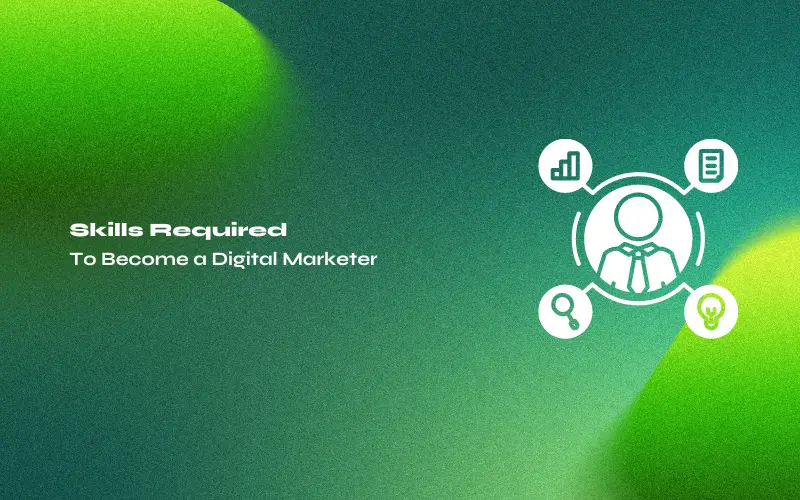
Data-Driven Marketing: Benefits and Challenges in 2025
Mar 10, 2025 7 Min Read 5490 Views
(Last Updated)
Imagine stepping into a world where every marketing decision you make is backed by solid evidence, not just gut feelings or guesswork. That imagination is a reality now, courtesy of data-driven marketing, which is a strategy gaining immense popularity with its ability to reshape how businesses connect with their audience.
Did you know that companies that adopt data-driven marketing are six times more likely to be profitable year-over-year? Yes, you heard that right. But what makes data-driven marketing such a game-changer, and why are businesses rushing to integrate it into their strategies?
In this blog, we’ll dive deep into the essence of data-driven marketing, exploring its top benefits and the challenges you might face along the way. From gaining precise insights about your audience to optimizing your advertisement budget, we’ll cover the A to Z of implementing a successful data-driven marketing strategy.
So, let’s dive right in, shall we?
Table of contents
- What is Data Driven Marketing?
- How to Implement Data-Driven Marketing?
- Benefits of Data-Driven Marketing
- More Precise Insights About the Target Audience
- Efficient Use of Right Marketing Channels
- Targeted and Customized Content
- Superior Market Analysis
- Enhanced User and Consumer Experience
- Advertisement Budget Optimization
- More Effective Strategies
- A Jump in Sales
- Challenges of Data-Driven Marketing
- Data Quality and Integration
- Privacy and Security Concerns
- Keeping Up with Technology
- Skill Gaps
- Analysis Paralysis
- Final Thoughts
- FAQs
- What is data-driven marketing?
- How does data-driven marketing benefit businesses?
- What are the key challenges of data-driven marketing?
- How can businesses overcome the challenges of data-driven marketing?
- What skills are essential for effective data-driven marketing?
What is Data Driven Marketing?
Data-driven marketing is the strategic approach of leveraging a wealth of data, derived from customer interactions and engagements, to inform and optimize marketing efforts. It’s about using insights gained from data analysis to make informed decisions, tailor marketing messages, and ultimately, enhance customer experiences.
Simply put data-driven marketing leverages customer data to predict their needs, preferences, and future behaviors. This approach enables marketers to craft personalized campaigns that resonate deeply with their target audience, ensuring higher engagement rates and a significant boost in ROI.
As per sources, data-driven organizations are 23 times more likely to acquire customers, 6 times as likely to retain customers, and 19 times more likely to be profitable! Yes, that’s how magnanimous the impact of data-driven marketing is.
That’s why, this method stands in stark contrast to traditional marketing strategies, which often rely on intuition and generalized assumptions about customer behavior.
Before we move to the next part, you should have a deeper knowledge of business analytics concepts. You can consider enrolling yourself in GUVI’s Business Analytics and Digital Marketing Course, which lets you gain practical experience by developing real-world projects and covers technologies including Power BI, Excel, SQL, Tableau, Data Visualization, etc. Additionally, if you would like to explore Marketing Research Techniques through a Self-Paced course, try GUVI’s Marketing Research Techniques certification course.
Common instances where you must have seen data-driven marketing being used include:
- Targeted Ads: Creating ads that cater to the specific interests of an audience.
- SEO Strategies: Utilizing search trend analysis to inform content creation and website optimization.
- Personalized Email Marketing Campaigns: Crafting emails based on user behavior and preferences.
- Content Recommendations: Suggesting content similar to platforms like Netflix or Spotify, based on user history.
- Social Media Campaigns: Creating campaigns that resonate with specific demographics, using insights from social media analytics.
- Customer Segmentation: Dividing customers into groups based on their characteristics to tailor marketing efforts.
- Price Optimization: Adjusting prices based on demand, customer preferences, and purchasing history.
- Website Personalization: Customizing the browsing experience for visitors based on their past interactions and preferences.
- Predictive Analytics: Using historical data to predict future trends, customer behaviors, and potential sales opportunities.
- A/B Testing: Comparing two versions of a webpage or app to see which performs better, based on real user data.
Also Read | 6 Ways Business Analytics Powers Effective Digital Marketing
How to Implement Data-Driven Marketing?
Data-driven marketing is more common than you can imagine, as you saw above. But how would you implement it yourself? For starters, implementing data-driven marketing requires a structured approach to transform raw data into actionable insights.
Here’s a step-by-step plan to get you started, which will ensure that your marketing efforts are both efficient and effective, leveraging data to drive better business outcomes:
- Collect Data: You should begin with gathering data from various sources such as social media, website analytics, CRM systems, and customer feedback. Just ensure the data is accurate and relevant.
- Analyze Data: Next, you need to make use of analytical tools to sift through the data. Try looking for patterns, trends, and insights that can conform to your marketing goals and strategies.
- Segment Your Audience: Now, based on your findings, divide your audience into segments based on their behaviors, preferences, and demographics. This will help you implement more targeted and effective marketing.
- Personalize Your Campaigns: Use the insights gained through the above steps to tailor your marketing messages and campaigns to meet the specific needs and interests of each segment.
- Test and Optimize: You need to continuously test different aspects of your marketing campaigns, using A/B testing or other methods. Analyze the results and optimize your strategies accordingly.
- Measure Results: You can specify various KPIs (Key Performance Indicators) and use them to measure the effectiveness of your data-driven marketing efforts. Adjust your strategies based on these metrics to improve ROI.
Benefits of Data-Driven Marketing
So many instances of data-driven marketing, which makes us wonder what benefits it must be offering to the marketers to make it such a rage.
Also Read | Adopt These Digital Marketing Trends in 2025 Or Get Ready To Miss Out!
The advantages of data-driven marketing can be seen in the boost of sales and engagement rates. Marketers can target their desired markets better, based on more precise insights from their current audience.
It also allows marketers to identify the right marketing channels, content, and user experiences that are most likely to strike a chord with their target audience.
Let’s understand the benefits of data-driven marketing in a little detail:
1. More Precise Insights About the Target Audience
The biggest advantage of data-driven marketing is that it offers an understanding of your audience with unparalleled clarity. Businesses can uncover detailed insights about their target market by analyzing customer interactions, purchases, and online behavior.
Data will give you a precise user persona of your targeted customers in terms of their age, location, occupation, preferences in the type of content, their specific needs, and even the optimal times for engagement.
For instance, a beauty brand might discover that its audience prefers eco-friendly products and values sustainability. Armed with this knowledge, the brand can tailor its marketing messages to highlight eco-friendly practices and products, resonating deeply with its audience and fostering a stronger brand connection.
Must Read: Top 8 Data Analytics Skills: A Comprehensive Guide to Thrive in the Industry
2. Efficient Use of Right Marketing Channels
Choosing the right marketing channels is crucial for the success of any campaign, and data-driven marketing makes this selection process not just easier but more effective. By analyzing where your audience spends their time and which channels drive the most engagement or conversions, you can allocate your resources more wisely.
You can easily identify the most profitable and active marketing channel for your product based on the data about your target audience’s demographics and content preferences (blog, email, Reels, stories, polls, carousels, etc.). This process might even widen your profit margin in the long run!
For example, if data reveals that a significant portion of your target audience engages with your brand through Instagram Reels rather than traditional email marketing, shifting focus and budget to enhance your Instagram presence becomes a strategic move. This ensures your marketing efforts are seen and engaged with, maximizing ROI from the get-go.
3. Targeted and Customized Content
The power of data-driven marketing shines brightly when it comes to delivering targeted and customized content. By understanding the specific interests, behaviors, and demographics of your audience segments, you can create content that speaks directly to them.
Most youngsters today are more engaged with short-form video content and influencer promotions. So, if your data shows that your target audience falls in that segment, you can create your strategy around promotion through reels and influencer marketing.
Data-driven marketing will also offer you superior predictive analysis and a chance to hyper-personalize your offerings and brand messaging. This level of personalization not only increases the likelihood of content consumption but also strengthens the emotional bond between the brand and its customers, leading to higher retention rates.
For example, a streaming service, using viewing history data, can recommend shows and movies that match the individual tastes of its subscribers, significantly enhancing user engagement and satisfaction.
Also Read | A Guide to Creating Compelling Digital Content
4. Superior Market Analysis
Similar to identifying the right marketing platform, data-driven marketing also offers a comprehensive view of the market, enabling businesses to identify trends, gaps, changes, patterns, and opportunities before their competitors. This superior market analysis can inform product development, marketing strategies, and even pricing models.
Take, for instance, a tech company that analyzes search trends and social media conversations to identify a growing interest in home automation products. By recognizing this trend early, the company can develop and market a new line of smart home devices, positioning itself as a leader in an emerging market segment.
This proactive approach, powered by data, ensures the company stays ahead of the curve and meets consumer demand in real time.
5. Enhanced User and Consumer Experience
Data-driven marketing significantly enhances the user and consumer experience by ensuring that interactions with the brand are relevant, timely, and personalized. Your access to data can help you figure out their changing demands and help you cater to them to get an edge over the competition.
For instance, an e-commerce website can use browsing and purchase history data to offer personalized shopping recommendations. This not only makes the shopping experience more convenient but also more enjoyable, as customers are presented with options that align with their tastes and preferences.
Such personalized experiences lead to increased customer satisfaction, loyalty, and ultimately, higher lifetime value. By consistently meeting or exceeding customer expectations, brands can cultivate a loyal customer base that is more likely to engage in repeat business and advocate for the brand.
Also, Read | Ways Data Science Carrying Marketing Efforts
6. Advertisement Budget Optimization
One of the most tangible benefits of data-driven marketing is the optimization of advertisement budgets. By analyzing the performance of past marketing campaigns across different channels and demographics, businesses can identify which strategies yield the highest ROI.
For example, a digital marketing team might discover that their video ads on social media platforms outperform traditional banner ads in terms of engagement and conversions. Armed with this insight, the team can reallocate their budget to focus more on video content, ensuring that every dollar spent is an investment towards achieving higher returns.
This strategic approach to budget allocation not only maximizes the effectiveness of marketing efforts but also minimizes wasted expenditure on underperforming channels.
Also, Read | Try These 15 Digital Marketing Strategies To Scale Your B2B Brand To New Heights!
7. More Effective Strategies
Data-driven marketing empowers businesses to develop more effective strategies by basing decisions on evidence rather than assumptions. This approach leads to the creation of marketing campaigns that are more likely to succeed because they are informed by real-world data.
For instance, a company might analyze customer feedback and engagement data to refine its product offerings or messaging, ensuring that it meets the actual needs and desires of its target audience.
This could involve adjusting a product’s features based on user suggestions or changing the tone of marketing communications to better resonate with the audience. As a result, the company’s strategies become more aligned with customer expectations, leading to improved outcomes such as higher conversion rates and customer satisfaction.
8. A Jump in Sales
Ultimately, the culmination of all the benefits of data-driven marketing is a significant jump in sales. It was observed that businesses that use data-driven strategies drive five to eight times as much ROI as businesses that don’t.
Businesses can dramatically increase their sales figures by understanding and catering to the precise needs of the target audience, optimizing marketing channels, personalizing content, and continuously refining strategies based on data analysis.
For example, a retailer that implements targeted promotions based on customer purchase history and preferences is likely to see a higher uptake of offers, leading to increased sales.
Similarly, a business that uses data to identify and tap into emerging market trends can capture new customer segments before its competitors, gaining a competitive edge that translates into higher sales.
Also Read: Best Way to Learn Digital Marketing in 2025
Challenges of Data-Driven Marketing
Implementing a data-driven marketing strategy, while beneficial, comes with its own set of challenges. Understanding these hurdles is crucial for businesses aiming to leverage data effectively in their marketing efforts.
1. Data Quality and Integration
One of the foremost challenges is ensuring the quality and integration of data. With information coming from various sources, such as social media, CRM systems, and website analytics, it’s vital to maintain accurate, clean, and consistent data. Poor data quality can lead to misguided decisions and strategies.
For instance, if customer data is not properly integrated across platforms, a business might miss out on understanding the full customer journey, leading to less effective marketing campaigns.
2. Privacy and Security Concerns
With the increasing scrutiny of data privacy and security, businesses must navigate the complex landscape of regulations like GDPR and CCPA. Ensuring customer data is collected, stored, and used in compliance with these laws is paramount. A breach or misuse of data can not only result in hefty fines but also damage a brand’s reputation.
For example, a company that fails to secure customer data adequately may face backlash and lose trust, impacting customer relationships and sales.
Also Explore: The Ultimate Cybersecurity Roadmap for Beginners
3. Keeping Up with Technology
The rapid pace of technological advancement presents another challenge. Staying abreast of the latest marketing technologies and analytics tools is essential for effective data-driven marketing.
However, constantly evolving tech can be overwhelming, and businesses may struggle to keep up. This can lead to missed opportunities in leveraging cutting-edge tools that offer deeper insights and more efficient data processing.
Also, Learn About Top Technologies to Learn in 2025: Jumpstart a Successful Tech Career
4. Skill Gaps
The effectiveness of data-driven marketing heavily relies on having a team with the right skills. From data scientists to digital marketing experts, the need for talent that can analyze data, derive insights, and execute data-informed strategies is critical.
However, there’s often a gap between the demand for these skills and the available talent pool, making it challenging for businesses to find and retain qualified personnel.
Must Know About Top Skills Required to Become a Digital Marketer
5. Analysis Paralysis
Lastly, the sheer volume of data available can lead to analysis paralysis, where decision-making is stalled due to overanalyzing data. Determining which data points are most relevant and actionable is crucial.
Without clear objectives and a focused approach to data analysis, businesses can get lost in the data, wasting time and resources without achieving meaningful outcomes.
Kickstart your career by enrolling in GUVI’s Business Analytics and Digital Marketing Course where you will master technologies including Power BI, Excel, SQL, Tableau, and Data Visualization, and build interesting real-life business-analytics projects.
Alternatively, if you want to explore Marketing Research Techniques through a Self-Paced course, try GUVI’s Marketing Research Techniques certification course.
Final Thoughts
In conclusion, data-driven marketing represents a pivotal shift in the marketing paradigm, offering a roadmap to success in today’s competitive business landscape. By leveraging precise data, companies can craft marketing strategies that are much more effective on a mass scale, yet deeply personalized, fostering a sense of connection and loyalty that traditional marketing methods struggle to achieve.
However, the path to harnessing the full power of data-driven marketing is not without its challenges. Yet, the rewards for overcoming these hurdles are substantial. As we move forward in an increasingly digital world, the ability to adapt and thrive in a data-driven marketing environment will distinguish the leaders from the followers.
Also, Explore About The History and Evolution of Digital Marketing
FAQs
-
Data-driven marketing involves using customer data to guide marketing strategies, decisions, and campaigns for improved efficiency and outcomes. It leverages analytics to understand customer preferences and behaviors, enabling personalized and targeted marketing efforts.
-
Data-driven marketing offers numerous benefits, including enhanced targeting and personalization, improved customer insights, optimized marketing spending, higher ROI, and increased sales. It allows businesses to make informed decisions based on actual customer data rather than assumptions.
-
Key challenges include ensuring data quality and integration, navigating privacy and security regulations, keeping up with technological advancements, addressing skill gaps within teams, and avoiding analysis paralysis by focusing on actionable insights.
-
Businesses can overcome these challenges by implementing robust data management practices, staying informed about privacy laws, investing in ongoing training and technology updates, hiring or developing skilled personnel, and maintaining a strategic focus on actionable data insights.
-
Essential skills for data-driven marketing include data analysis and interpretation, knowledge of marketing analytics tools, understanding of privacy regulations, strategic thinking, and the ability to translate data insights into actionable marketing strategies.




















![How to Switch from Sales to Digital Marketing: A Beginner's Guide [2025] 2 sales to digital marketing](https://www.guvi.in/blog/wp-content/uploads/2025/01/How-to-switch-your-career-from-Sales-to-Digital-Marketing.png)









Did you enjoy this article?